A couple of years since her election as Academic Officer, I virtually sat down with Giang Nguyen to discuss the challenges and rewards holding the highest academic role a student can fill. She has a unique insight, having been elected as a second year student, and holding office during the start of the pandemic.
We started by talking about the role and the responsibility of bridging the gap between students, academic reps, and the University.
“It’s the highest representation position within the University, so you have access to all the senior staff at the University. You represent every single student at the Uni, which is obviously a big job, but if you really think some issues need to be sorted because you were a student before and know what’s going on, then definitely run for it and be the one who solves it.”
A key part of running for office is the creation of a manifesto — a statement of what you will do during your time. It’s written before a student has had experience of the role, and priorities can change in the face of new experiences and a changing local and global environment. Giang’s manifesto was written before the pandemic, yet she spent her last months as an officer dealing with its effects.
When asked about how her original ambitions changed over time, Giang admitted that her manifesto pledge on improving representation in the Languages For All scheme was sidelined for other projects, saying “she didn’t work massively on that because there are other priorities I think should be engaged”.
When reflecting on the highlights of her year in office, Giang noted a clear priority she found during her time as officer.
“I picked up the racial justice agende six months into the job. It wasn’t on my manifesto the first time I ran.”
“It’s a very core issue now. I later campaigned about decolonising and diversifying the curriculum, and then did two events.”
To those planning their own manifesto, she advises to “engage with as many people as possible” and to “write what you believe in and what you see at uni”. Giang shared with me her own path, not just to the role, but the UK, having moved here four years ago to start her A levels. In this, there’s a recognition that a student’s experiences shape their outlook and what they aim to achieve. Giang summed this up: “obviously people come from different perspectives, and that’s why people have very different manifestos.”
With any role, there’s a difference between expectations and reality – something I sought to explore further with Giang. I asked her about her preconceptions of the role, and parts that didn’t match up to those expectations, “Things take longer to complete than I thought. For example, one of my big manifesto points in First year was about improving student representation. I thought I could do it in a month, and to the last day I was still working on it because there are so many layers to it.”
Like a mutant mayfly, Sabbs last only a year, and as such they find themselves passing on their work to the next team. Giang was disheartened by backwards steps in diverse representation within the Union.
“Last year there were two BAME staff at the Union but after I left and another staff left there was no-one, and I think that’s significant. The battle for gains in racial equality is still ongoing, and I hope candidates pick up on that. It’s a very long battle.”
Giang sought to make clear the challenges and opportunities COVID brings to the role.
“Potential candidates need to be aware that COVID affects every single aspect of student life, and they should have a clear vision of how they will represent students, and how they want to make their lives better under COVID.”
A side-effect of the pandemic is that campaigning in the elections has been moved entirely online. Talking from her own experience, Giang emphasised the need to maintain wellbeing during the campaign.
“When you spend too much time on Facebook and Twitter trying to get people to vote for you, that can be very tiring.”
Help in running can come from all kinds of areas. Giang told me that when she ran, “I was messaging loads of people asking for help and advice”. There’s a clear sense of pride and warmth when Giang talks about being elected, and the new environment she found herself in — it’s new but offers plenty of opportunities.
“Being a Sabb is a massive privilege. You’re able to talk to people holding so many different jobs and [at] different levels. You have insight into how the university works, how education works, how [the] public sector works. You’re able to choose, you know, where you’ll fit in”
An often underappreciated aspect of the role is just how different an environment the officers operate in. There are plenty of students, but also plenty of managerial staff and professionals. However, Giang tells me that being a student is a strength.
“People we’re dealing with are 30… 40… 50. They have been in their career for years, but you have the experience of being a student, and they don’t have that experience.”
Typically students run in their final year, as the sabbatical officer roles require you to take a year out for the full-time job. That’s the sabbatical part. However, Giang ran in her second year and doesn’t believe it should be a barrier.
“I really think you should run if you’re first, second, or third year. Run if you have a vision.”
Giang tells me quite strongly that she believes Sabbs should run to make a difference, rather than to bulk up their CV, telling me: “If you just run for the role for something on your CV, then I don’t think it’s something you should do”.
Having run for re-election and narrowly lost, Giang has felt the highs and lows of campaign success. She reflected on how she reacted to her loss:
“Getting rejected by people who you thought voted for you at first is quite disheartening, but I didn’t have regrets from that because I did try my best, and that really helped in a sense.”
Even after her unsuccessful re-election campaign, she offered consolation.
“Just try your best. If you don’t win, it’s not the worst thing”.
As we wrapped up, Giang had one final message for people thinking of running for any of the sabbatical officer roles.
“Every candidate who is considering running should think of two questions. Whether their running will be good for the community around them, the Uni of York or York in general. And secondly, will it be good for them. Will they be passionate about that job? Those are two questions I asked myself before running for the role, and I said yes, so that’s why I ran for the role twice.”

